|
Tomorrow, we celebrate the birthday of St. Vincent Pallotti, patron of the Catholic Apostolate Center and founder of the Union of Catholic Apostolate. St. Vincent Pallotti was born on April 21, 1795. How appropriate for the saint who lived and worked in the city of Rome to share his birthday with the traditional date for the founding of the city. To help celebrate his birthday, I have put together a list of some of his more interesting achievements and activities during his life. I hope that you too will be inspired by his life. 1) The Baptism of St. Vincent Pallotti St. Vincent Pallotti was baptized on April 22, 1795 in the St. Lawrence Church in Rome. This began his life in the church. 2) St. Vincent Pallotti on Holiday On his arrival in Frascati around 1805, St. Vincent Pallotti exchanged his new shoes for that of a poor boy. Giving away his new clothing to the poor would become a lifelong habit for the saint. 3) St. Vincent Pallotti Makes a Prediction While speaking with the young Giovanni Mastai-Ferretti in 1817, St. Vincent Pallotti predicted that he would one day be elected to the papacy. Mastai-Ferretti was elected Bishop of Rome on June 16, 1846. 4) St. Vincent Pallotti the Professor St. Vincent Pallotti was awarded two doctoral degrees in both theology and philosophy in 1814 and 1819. Teaching was one of the favorite activities of the saint. 5) St. Vincent Pallotti Showing Courage During the cholera epidemic of 1837, St. Vincent Pallotti organized a barefoot procession of religious. This action was penitential and showed that they were not afraid of the disease. 6) Catholic Apostolate Received Church Approval St. Vincent Pallotti received approval for the Catholic Apostolate from the Church in 1835. Pallotti also received support for the Catholic Apostolate from Pope Gregory XVI when others objected to it. 7) St. Vincent Pallotti the Chaplain Beginning in 1838, St. Vincent Pallotti served as a prison chaplain in Rome. He often worked with the condemned, saving many souls. He had a true willingness to serve all, especially the poor and the marginalized. 8) St. Vincent Pallotti the Peacekeeper St. Vincent Pallotti stopped a riot in the Trastevere neighborhood of Rome. He implored the people to stop rioting by showing them an image of Mary, Mother of Divine Love. 9) St. Vincent Pallotti Preaches one Last Time On the last day of the octave of the Epiphany in 1850, St. Vincent Pallotti gave his final sermon. 10) St. Vincent Pallotti Dies In 1850, St. Vincent Pallotti gave his final blessing to his followers. He showed great courage even in the face of death. There are many more stories about St. Vincent Pallotti that you may find interesting. Check out our St. Vincent Pallotti Portal to learn more about our patron and his many works.
0 Comments
“Joy is prayer, joy is strength, joy is love, joy is a net of love by which you can catch souls.” -St. Mother Teresa of Calcutta Throughout history, mankind has endured plagues, wars, and all sorts of crises that threaten our existence and make the day to day seem unbearable. In these past several months, the world has experienced the global effects of the novel coronavirus pandemic. Our country is also facing ramped up civil unrest. However, as Christians we are called to persevere with joy. As James 1:2-4 exhorts us: “Count it all joy, my brothers, when you meet trials of various kinds, for you know that the testing of your faith produces perseverance and perseverance must complete its work so that you will become fully developed, complete, not deficient in any way.” We can look back over two millennia and witness the hope that has always been present in the darkest of circumstances. Over and over, God our merciful Father remains with us, equips us with strength, and encourages us to dwell with Him in order to endure all things with joy. Furthermore, we have many examples of holy men and women who have stood steadfast in faith through great trials as joyful ambassadors of God’s love and mercy. During these times, I have felt the pangs of doubt, discouragement, and fear. I am completely aware of my smallness and my vulnerability. I keenly recognize that I need help so that I can find peace amidst hardship and uncertainty, and I daily choose to pray for guidance and courage to walk in faith. I am grateful for parents who raised me in the Church, taught me the power of prayer, and nurtured me in an environment of faith. I am grateful for my parish family who stand together to build up the Body of Christ in our community. I am grateful for a stalwart husband who shows me daily how to immerse myself in the loving arms of Jesus by attending Mass, reading Scripture, praying devotions, and asking for the divine blanket of protection and provision that only comes from Him. I am grateful for my married children who witness their sacramental love to all by living their marriage covenant. I am grateful for children who share their gifts to fill our home with laughter, creativity, and beauty. I am grateful for grandchildren who are joyful and full of curiosity and excitement and so easily make me forget about the troubles of the world. I know that I am puny, weak, and small, but God made me for love and reminds me through all these people—and many more—that He is always with us, giving us what we need to gallantly march through the nitty gritty of life. This gives me cause for great joy! How we behave determines the success of our mission as ambassadors for Jesus. We are told in Scripture to remain in God and to use the gifts of the Holy Spirit to navigate the messiness of this life. We are commanded to love God, others, and ourselves no matter the circumstances. The fruit of living in love is a joyful countenance. When we practice surrendering our doubts and fears and choose to act in faith and love, peace is a direct outcome. When we live out of an attitude of peace, we are unbound and able to exhibit joy in all things. St. Teresa of Avila encourages us: “Let nothing disturb you, nothing frighten you, all things are passing, God never changes. Patient endurance attains to all things. Whoever possesses God is wanting in nothing; God alone suffices.” As Christians, we are called to be the living reflection of our Lord and Savior. As we traverse this particularly troubling time, we strive to be beacons of hope to those despairing, lost, and without a foundation of faith. We are all commissioned to share the love and mercy of God to all we come in contact with. It is not a suggestion, but a mandate from our baptism. No matter how inadequate we think we are, if we surrender to God’s will, He will supply all we need to make any situation bearable and even joyful. There may be uncertainty, strife, devastation and hardship around us, but the heart of Jesus, who is all love, is within the soul of each of us. We are called to make it manifest through our acts of kindness, gentleness, patience, forgiveness and service. Each of us, one individual at a time, has the power to bring peace and joy to others as we continue to navigate the day to day. Below are some practical tips for remaining steadfast in faith and witnesses of joy:
Together, each of us mere mortals can build an environment of joy—a joy which will make all the difference in our hurting world. The opening of today’s reading from the Gospel of John depicts Mary Magdalene on the cusp of an encounter with the Risen Christ. “But Mary stayed outside the tomb weeping. And as she wept, she bent over into the tomb and saw two angels in white.” In this moment of bending down and looking into the tomb she thought was empty, Mary provides an everlasting model for those of us seeking the Risen Christ throughout Easter and throughout our lives. Where Jesus’ tomb had been a place of death, it is now a place of resurrection. Where Mary’s tears had symbolized her grief, they now contain her joy. This amazing moment came on a morning when Mary was vulnerable and traumatized. I cannot imagine what Mary must have been feeling there, alone – but I can only guess that seeing Jesus alive again would have been the last thing on her mind. When I feel vulnerable, my world feels very small. In grief and pain, it is difficult to “think outside the box” or to think about the “big picture.” In fact, it is difficult to think at all. Many of us are living now from this place of smallness in the light of the coronavirus pandemic. We are currently facing dangers that have fundamentally altered the patterns of our Church life and our society – along with many other woes that can cause us to despair. The Good News is that none of the woes of the world can separate us from God’s love. As Jesus told the disciples, “I will see you again, and your hearts will rejoice, and no one will take your joy away from you.” (John 16:22) I hope that this Easter week brings you such joy. And if you still have grief, I invite you to trust that it’s okay, and that God can work within that grief. We can take courage from the example of Mary Magdalene, whose own tears opened the portal between life and death. From Mary’s story and from my own story, I have faith that God can work directly within our sorrow – opening new possibilities when we had thought all the doors closed. I believe this is where God is most fully present in our lives – in the spaces where we feel lost, abandoned, and confused. In this way, I am hopeful that this Easter season will help all of us to encounter Christ in truly new and unimagined ways. For more Easter resources, please click here. “At the school of Mary, we learn that her life is marked not by protagonism but by the capacity to enable others to be protagonists. She offers courage, teaches people to speak, and above all encourages people to live the boldness of faith and hope. In this way she becomes the transparency of the Lord’s face who shows his power by inviting and calling people to participate in building up his living temple.” – Pope Francis, Homily on the Feast of Our Lady of Guadalupe, 2018
Such a strange thing Christ has done! He has left his mission to the baptized until he comes again in glory at the end of time. This is the part of Advent waiting that we often do not dwell on. The first half of Advent is very much focused, though, on this reality. Our waiting is not passive, but very active. We are protagonists who are called to boldly witness Christ in our lives. Bold witness in the way of Our Lady of Guadalupe, who encouraged St. Juan Diego to go forth to build not simply a physical temple in the Lord, but one that is living. In a time of needed renewal within the Church, we turn to the Blessed Virgin Mary to be with us, but also to give us example. She did not focus on the reality of the change in her life when she heard the message of the Angel Gabriel. Instead, she rose and went “in haste” to her cousin Elizabeth to rejoice and be in solidarity with her. Elizabeth’s son, St. John the Baptist, later went forth to prepare others for the coming of the Messiah through conversion of hearts and minds to the Lord. We, too, are meant to do the same. We cannot sit back and wait for others, but need to go forth with urgency, in haste, “inviting and calling people to participate in building up his living temple.” This inviting and calling that enables “others to be protagonists” has a name – co-responsibility. It is co-responsibility for the mission of Christ and his Church. Pope Francis invites us to “move towards a participatory and co-responsible Church, one capable of appreciating its own rich variety, gratefully accepting the contributions of the lay faithful, including young people and women, consecrated persons, as well as groups, associations and movements. No one should be excluded or exclude themselves” (Christus Vivit, 206). Therefore, may our Advent waiting not be passive, but very active in our bold witness of Emmanuel, King of the Nations and Prince of Peace! Our Lady of Guadalupe, pray for us. May the Charity of Christ urge us on! The next forty days of Lent are Mother Church’s annual call to intense prayer, fasting, and almsgiving oriented towards embracing God as the center of one’s life and repenting of all which distracts us from Him. With the current crisis for the Church in the United States, it seems that the Church could really use a good spiritual renewal, cleansing, and renunciation of sin often focused on during the season of Lent. As parts of the Body of Christ[1], we are all too aware how an affliction experienced (or caused) by one part affects us all. Recall the words of St. Paul, “Rejoice with those who rejoice, weep with those who weep... Do not be conquered by evil but conquer evil with good.”[2] The Church is suffering but, just as she always has, she will ultimately be restored for the glory of God. As laity, you and I are key to addressing this scourge, along with the Church’s holy clergy and religious, and to affirming God’s presence in our lives not just in the Lenten season, but every day.
Though a time of repentance, Lent is not a time of despair or hopeless suffering; this season reminds us that God, although saddened by our repeated failings, never closes Himself off from offering mercy and love to the broken, the sinner, and the lost. Lent is not a diet, nor a fad of living without something trivial, nor even a temporary spiritual renewal; it must take root—free from the sin which prevents this—and be nourished over the coming weeks to strengthen us throughout the whole year. Above all, Lent prepares us for the celebration of Easter. Christ has died, Christ is risen, Christ will come again; the Church suffers, the Church is renewed, the Church shall be restored! The abuse scandal today may cause people to feel abandoned, angry, confused, and sad. “How can this be happening?” is certainly a question in our hearts and homes these days. It is important to remember that Jesus Christ, the same “yesterday, today, and forever,”[3] reigns over the Church. He is omnipotent, divinely good, and eternal; Let us take courage in the truth that our faith is ultimately in Jesus Christ. Because our Lord remains faithful to us[4] and ever close to His bride, the Church, He gives us the strength to recommit ourselves to renouncing the evil in our sight that threatens to drive us away from God and His Church. Lent is the perfect opportunity to facilitate spiritual renewal, not only for ourselves but also for the greater Church. Following the example of Jesus’ time in the desert before commencing His public ministry, the faithful are invited to reflect on the state of the Church, pray for strength, courage, justice, and healing, and even seek accountability in the governance of the Church. Personal penance can be made for our own failings, but reparation must also be made to address this scandal and to unify God’s people to prayerful and peaceful action in seeking God’s healing grace to move forward. Over the next 40 days, let us care for the Church by promoting healing among ourselves, supporting the afflicted and needy, addressing sin and divisions, and always proclaiming Christ to each other and the world. For more resources to accompany you throughout the Lenten season, please click here. [1] cf. Lumen Gentium, 33. [2] Romans 12:15, 21. [3] Hebrews 13:8. [4] cf. 2 Timothy 2:13. 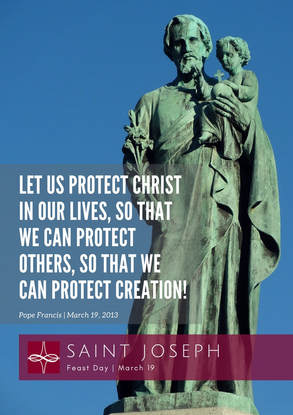 "In the Gospels, Saint Joseph appears as a strong and courageous man, a working man, yet in his heart we see great tenderness, which is not the virtue of the weak but rather a sign of strength of spirit and a capacity for concern, for compassion, for genuine openness to others, for love. We must not be afraid of goodness, of tenderness!" - Pope Francis (Homily for the Beginning of the Petrine Ministry of the Bishop of Rome, March 19, 2013) Blessings on this Solemnity of St. Joseph! As we celebrate this feast day of the Patron of the Universal Church, we also celebrate the fifth anniversary of the beginning of the Petrine ministry of Pope Francis. He chose this day particularly for this event and later inserted an invocation of St. Joseph into all the Eucharistic Prayers, not simply Eucharistic Prayer I (Roman Canon). Pope Francis not only invites us to see St. Joseph as protector of the Universal Church, but also calls us all to be protectors who live with tenderness that shows the love of Christ. What does it mean to be a "protector"? In the same homily quoted above, he offers us an answer, which he witnesses as pope. "In [St. Joseph], dear friends, we learn how to respond to God's call, readily and willingly, but we also see the core of the Christian vocation, which is Christ! Let us protect Christ in our lives, so that we can protect others, so that we can protect creation! The vocation of being a "protector", however, is not just something involving us Christians alone; it also has a prior dimension which is simply human, involving everyone. It means protecting all creation, the beauty of the created world, as the Book of Genesis tells us and as Saint Francis of Assisi showed us. It means respecting each of God's creatures and respecting the environment in which we live. It means protecting people, showing loving concern for each and every person, especially children, the elderly, those in need, who are often the last we think about. It means caring for one another in our families: husbands and wives first protect one another, and then, as parents, they care for their children, and children themselves, in time, protect their parents. It means building sincere friendships in which we protect one another in trust, respect, and goodness. In the end, everything has been entrusted to our protection, and all of us are responsible for it. Be protectors of God's gifts!" As one can see from the highlights above which link to an encyclical, two apostolic exhortations, and the bull of indiction of the Extraordinary Jubilee of Mercy, Pope Francis outlined in his inaugural homily some of the themes of the teaching of his pontificate. His actions toward those on the peripheries witness as well to how we can both protect and show tenderness, "responding to God's call" as St. Joseph did. For as he said also in his homily, "only those who serve with love are able to protect!" May the Charity of Christ urge us on! "The confession of evil works is the first beginning of good works." -St. Augustine I’ll come right out and say it: I dislike going to Confession. I really do. And so I avoid it like the plague. We all have our struggles in faith, and this is my biggest one. “Why do I have to seek out a priest, another human, and tell him all the bad things I’ve done? Can’t I just talk to God directly? Doesn’t God hear everything in your heart?” We’ve all heard these questions—challenges, really—about the need for regular visits to the confessional. After all, God does know everything in our hearts. We can talk to him directly, and we should do so often! But we need more than just that internal dialogue with God. Our faith, after all, isn’t one lived alone. St. Paul tells the Romans, “We, though many, are one body in Christ and individually parts of one another.” (Romans 12:5) I may be a toe, you may be an earlobe, but we all, collectively, make up the one Body of Christ in the Church. So if that’s what we truly believe, and one of those parts gets hurt, the whole rest of the body feels that pain. If you stub your toe, the whole of your body stops everything and focuses on that pain. So, too, when we stub our spiritual toe, we create a ripple throughout the rest of the Body. We could talk at length about the nature and effects of sin, but that’s for another discussion. The point is that each of our sins have an effect, not just on ourselves and on God, but on the whole of the Church, too. And so we have three people or groups to reconcile with when we’ve sinned: ourselves, our Creator, and the larger Body of which we are each a part. And who better to forgive our sins than a priest? He’s a spiritual father, a representative of the Church, and, most importantly, someone who acts “in persona Christi,” or “in the person of Christ.” By virtue of his ordination, each priest has been given some pretty awesome powers. He can baptize people, he can bless places and things, he can call down the power of God onto simple bread and wine, miraculously turning it into Christ’s Body and Blood. So if he can do all those things, can’t he also exercise the power Christ gave the Apostles after his Resurrection? “Whose sins you forgive are forgiven them, and whose sins you retain are retained.” (John 20:23) That’s crazy! But it’s our faith, and it comes from Christ himself. We profess this in the Apostle’s Creed: “I believe…in the forgiveness of sins…” Now we’re all thinking, “Okay, that’s all well and good, but Confession is still too uncomfortable.” And you’re right! It is. That’s why I dislike going. I don’t like being uncomfortable. I don’t like to acknowledge the messy parts of life, including my own failings and shortcomings. I don’t like to admit that I’m wrong, especially when I keep doing the same wrong thing over and over again. But every time I finally buck up the courage (sometimes after months or years) to walk into a confessional, I’m never disappointed. The result is always the same: God has forgiven me and wiped the slate clean. And I feel so good about it! It’s not that I’m afraid of God’s mercy. In fact, I crave it. The problem is that I’m too afraid of my own self, of my own fragile and broken humanity, to even ask for this mercy. In my heart of hearts, I don’t believe I deserve it. And that’s the thing: none of us deserve it. Not one of us can ever be sorry enough, contrite enough, penitent enough, to make amends for what we’ve done and continue to do over and over again. We can never fully make it up to God; that’s why he sent his Son. Jesus took the sins of the whole world on his shoulders, beaten and bloodied though He was, until he became sin itself: “For our sake he made him to be sin who did not know sin, so that we might become the righteousness of God in him.” (2 Corinthians 5:21). He took every sin each of us will ever commit, carried them up on the cross, and died as payment for it. He’s already paid the price for us. It’s like a spiritual gift card that never expires, but we have to use it to take advantage of the gift. That’s why Confession is so important: the mercy is guaranteed; we have but to ask for it. Pope St. John Paul II once said, “Confession is an act of honesty and courage - an act of entrusting ourselves, beyond sin, to the mercy of a loving and forgiving God.” In this Jubilee Year of Mercy, may we all be honest and courageous enough to do that. Whether you just went to Confession last week or, like me, have been putting it off for way too long, be courageous and just go. Let the Year of Mercy have some personal meaning for you, and let God forgive you for what He’s already paid for upfront. For more resources on Confession and the Jubilee Year of Mercy, please click here. In the days and weeks leading up to my now 6-month-old goddaughter’s birth and subsequent baptism, I often found myself repeatedly explaining her name. “Zelie . . . she is named after a newly-canonized saint who was a wife and the mother of St. Therese of Lisieux.” That simple statement has paved the way for several conversations about what exactly it was that made Marie-Azélie, lovingly called “Zelie,” a saint.
On this day, July 12th, the Church celebrates (for the first time!) Sts. Louis and Zelie Martin. At first glance, they led ordinary lives. However, it was precisely in the ordinary nature of their lives that they allowed God to do something extraordinary through them. Sts. Louis and Zelie Martin would attend early morning Mass regularly, persevered in faith after the tragic deaths of four of their nine children, and allowed their work to be an opportunity for their sanctification. During their canonization homily, Pope Francis said, “The holy spouses Louis Martin and Marie-Azélie Guérin practiced Christian service in the family, creating day by day an environment of faith and love which nurtured the vocations of their daughters, among whom was Saint Therese of the Child Jesus.” He continued, “The radiant witness of these new saints inspires us to persevere in joyful service to our brothers and sisters, trusting in the help of God and the maternal protection of Mary.” By saying yes to God in the mundaneness of our daily life and work, as Sts. Louis and Zelie did, we pave the way for courageously saying yes in life’s bigger or more difficult moments. Upon getting married and starting a family, Sts. Louis and Zelie had no idea that they would lose four of their children or that their youngest child would become a great Doctor of the Church. What they did know – and what remains true for us today – is that hoping and trusting in God’s plan will never leave us disappointed. The witness of Sts. Louis and Zelie shows us that by being faithful to God in life’s seemingly small moments, we can show the world that there is a plan greater than anything we can begin to comprehend. So what exactly made Zelie and Louis Martin saints? They repeatedly chose to thank God for His many gifts, serve Him in their vocation to marriage and family life, and glorify Him in work. The saints are people who did ordinary things in extraordinary ways, and this is certainly true of Sts. Zelie and Louis. By their witness, we are inspired to live the “extraordinary ordinary” well and one day join them in our heavenly home. Sts. Louis and Zelie Martin, pray for us! Tomorrow the Church celebrates St. Catherine of Siena, a 14th century tertiary Dominican and Doctor of the Church, who is renowned for her ardent prayer, peacemaking, and writing. Her life is filled with stories that reflect a transparent faith in the power of God’s intervention, her desire for unity within the Church, and her gifts in healing and touching the lives of others.
I discovered St. Catherine a few years ago when I read this passage. She writes these words with the same devotion and absolute trust with which she lived her life by: “I don’t want you to yield to weariness or confusion, no matter what may trouble your spirit. No, I want you to keep the good, holy, and true faithful will that I know God in his mercy has given you. Be glad…celebrate! Without any slavish fear take courage. Don’t be afraid, no matter what has happened, no matter what you see coming. Take courage for perfection is very accessible” (excerpt from her Letter to Br. Raimondo of Capua at Avignon). Whenever I read these words, they indicate to me that St. Catherine must have experienced trials herself and had her faith tested. Don’t we all struggle with weariness or battle the armies of confusion? St. Catherine doesn't want us to get caught up in the messiness of our sins and plights but rather in the will of God that will lead us through our struggles. The reason we should "be glad and celebrate" is because God's will is there to guide us through the midst of it all. And this, as St. Catherine reminds us, is a wonderful gift of God's great mercy, which is able to penetrate into our past, present, and future experiences. God’s will can sometimes seem so hard to understand, a mystery that is more hidden than it is found. Many often ponder, "What is God's will for my life? and ask, "Lord, what is your will…what should I be doing?” But St. Catherine knows God's will is more simple and apparent than we think. He doesn't hide it so much as reveal it or deter us so much as lead us to it. We should “take courage” because God has revealed everything in the perfection of Christ his Son, who lived among us and entered into the human experience. He is so near, so accessible. What is God’s will for us then except to grow into the perfection of Christ? St. Paul reminds us that, “God has called [us] through our Gospel to possess the glory of Jesus Christ.” (2 Thes. 2:14) Every day we are invited to grow towards sanctity and heaven by rising with Christ in the midst of our circumstances. We are to mature in love so as to become ourselves fully in Christ. If we strive for this first, God will surely lead us down the narrower paths of our lives. God is always at work in us if only we open ourselves to him. I invite you to think and pray about your own life. How have you grown in virtue over the years? This is evidence of God’s grace alive in your heart and mind! St. Catherine points directly to Christ, the Fountain of Life that is never depleted of its mercy and compassion! In him we really can do anything. Let us then “take courage” in our lives and “celebrate” Christ and the mercy of God! We need not be afraid! Thank you St. Catherine for your life and example! Pray for us, that we can fight the good fight and become ourselves fully in Christ. May we experience deeper the reality of God’s great mercy. For more resources on the Jubilee Year of Mercy, click here. In my adult years, I have often turned to St. Teresa of Avila as a spiritual mother. I love her courage, her passion, her wit, and her boldness. Throughout her life, she was always on the go. She was a reformer who brought the Carmelite Order back to its original roots. She got things done, founding over fifteen monasteries. And yet she was a great mystic--a woman who received beautiful graces, revelations and experiences of God in profound ways that are hard to tangibly explain. She went into ecstasies as a result of her deep relationship with the Lord and wrote a book called The Interior Castle about the journey of faith leading to union with God. I love the synthesis of the practical and the mystical in her personality. This synthesis becomes more compelling in our lives today, for it reveals that we are capable of a deep interior life and relationship with God in the midst of the busyness of life.
There is a story about Teresa of Avila that has caused me to laugh in genuine appreciation of her character. According to tradition, Teresa fell off her donkey while journeying to visit one of her convents--causing her to land in the mud and dirty her Carmelite habit. With her quick, fiery Spanish temper, Teresa looked up to heaven and said to God, “If this is how you treat your friends, no wonder you don’t have many.” I love this story because it beautifully depicts St. Teresa’s humanity and honest relationship with God. It is a raw, unfiltered moment of frankness that I believe is an example of both true prayer and transparency in our relationship with God. If prayer is ongoing dialogue with God through words, thoughts or actions, what is Teresa’s statement if not prayer? She talks to God with confidence and trust. She is bold about her feelings, knowing that God can handle her honesty. Notably, where does Teresa turn first in her day to day life? To God. He is her crutch, her foundation, even in times of frustration and annoyance. He is at the forefront of her mind. When I first heard this anecdote, I could completely relate to St. Teresa. Like her, I fall down on the road towards holiness. Furthermore, I often catch myself blaming God for different moments of hardship and frustration. What we sometimes miss as we lie there in the mud is the hand that’s in front of us--the extended hand of Christ that I often imagine in the story of the woman caught in adultery who Jesus saves from being stoned. God is not the one who pushes us down, but he is the one who picks us up. How quick are we to reach for the outstretched hand? Do we even reach out for it? Or are we too proud, choosing to try to get up by ourselves? What did St. Teresa do? In one of her reflections, she writes, “I praise the mercy of God, for it was he alone who gave me his hand.” (Life, Ch 7, The Collected Works of St. Teresa of Avila, Volume One, ICS Publications, Washington D.C. 1987) Do we turn immediately to God in our day to day lives? This is a question we can all reflect upon. Taking our reflection a step further, do we respond to the situations in which we find ourselves with joy or a sense of humor? I believe Pope Francis and St. Teresa would have been great friends. In his homily at the canonization Mass of Junipero Serra, Pope Francis reminded us of St. Paul’s command to “rejoice always.” If we forget this call, we fall into the temptation of becoming “sourpusses”--to use Pope Francis’ term. We are called to be people of joy in the midst of suffering, not in the absence of it. It is this type of transparency in our relationship with God, this type of outlook on the life of faith, this sense of humor that helps us move forward in answering the universal call to be missionary disciples who witness to the Gospel through their encounter with those around them. Like St. Teresa, may we always have a sense of humor. May we be bold and honest in our dialogue with God. May we be apostles of joy. And may we join in saying the phrase very often attributed to her, “God protect us from sour-faced saints”! Forever and beyond will beauty last upon the fabric of this path we are all on. Life is a journey and a time of change, but the love and beauty that emits from the experience of life will last, will remain, and will persevere. Everything that goes through this life journey we lead as creations of a One, True, Loving Lord adds to the over-abundant beauty that is this light for our feet. From the spectacular of fireworks to the humblest of daily chores, everything holds within it an essence of glory, a glory given by the graces of the awakenings of the Spirit in this life. Such essence of glory protrudes into the days and nights, into our sensual stimulators by one path and one path alone, beauty. Beauty in the form of simple things, grand things, petty things, and profound things. Each passing moment has beauty in it to be recognized. All things bright and beautiful stem directly from our Divine Creator. All beautiful things reflect the love and care of the beautiful Father, abounding in glory and radiant light for all to experience.
Beauty can be seen in everything and everyone, if only we have the courage and wisdom to look hard enough. Such avenues of beauty are the various art forms of life, for example, works of art, music, literature, friendships, emotion, or moments indescribable by words. Art forms are anything that leave an impression on us, for life itself is the grandest of art forms that pours forth in everything it is. It is hard for us all to see the beauty in suffering or in times of darkness, but that doesn't mean it isn’t there, in the wrinkles and the silver linings that radiate beauty in a different light than what we are used to. For life, beauty is there. The Saints are good examples of the beautiful life, each one leading vastly different lives. Life is beautiful in each human experience, including the suffering and dark stuff. The Saints are good demonstrations of the beautiful human experience, including within it all sides of life: the good, the bad, and the ugly. Saint Kateri Tekakwitha, whose feast we celebrate today, is quite extraordinary and is a good example of the kind of beauty I am discussing here. Her life, besides her ardent Catholic faith, was normal for a girl in her Native American village. Her life was beautiful in her great faith, in her dealings with her family and those who did and could not understand her reasoning for believing that Christ Jesus was her Savior, and finally in her simple yet profound suffering and eventual martyrdom. She is the “Lily of the Mohawks.” Contemplate the Lily for a moment: the petals, the pollen, the beauty. So simple yet so complex, yet beautiful in its complexity. This is Saint Kateri. She is the lily, the beauty of a life lead in the faith of Christ. Personally, I have had a special devotion to Saint Kateri ever since fourth grade. My teacher chose then Blessed Kateri to be the one we all prayed for in our daily prayer time. Growing off of that initial, prayerful experience with Kateri, when she was finally canonized, I studied her life and virtues in depth, reflecting and praying intentions through her intercession. For eyes to see the beauty of the world and of everything you experience, pray to Saint Kateri, and like a lily may she blossom in all of us the joy of the beautiful Savior, whose blood painted the most beautiful image of all, our salvation. William Clemens is an Undergraduate Student of Theology and Religious Studies at The Catholic University of America in Washington, D.C.  Courage and perseverance are two traits that I admire. The latter is a characteristic that not many people have, is hard to teach, and one that is imperative for success. In my classroom of 2nd graders, I try to remind them to “not give up, but try again and again.” When they become frustrated with challenging work or difficult friendships, they stop wanting to try again. They start to give up - but I tell them, “Keep trying!” and “Don’t be afraid to make a mistake!” Hopefully, one day my students will grow to recognize how courage can help them persevere through anything. People who do extraordinary things should be recognized for their courage and conviction. Saint Catherine of Siena, whose feast day we celebrated yesterday, is a woman whose contributions to the Church, taking action in times of need and exceptional theological writings, sometimes can be overlooked. Born in Siena, Italy in 1347, Catherine spent her life doing the will of God. She began receiving visions and praying to God from a very early age, even seeing in one in which Christ reassured her with an armor of courage that could overcome anything that tempted or threatened her. St. Catherine lived her entire life in prayer and was named a Doctor of the Church by Pope Paul VI on October 4, 1970. She along with St. Teresa of Avila and St. Therese of Lisieux are the three women to have been bestowed with such a title. St. Catherine worked to return Pope Gregory XI to Rome, from Avignon France where the Papacy had been residing for 67 years. Her determination to see this mission through was a testament to her unwavering courage to do God’s will. In her many philosophical letters, prayers, and the Dialogue, St. Catherine reflected on four theological concepts with which she considered while in ecclesiastical mysticism. The first was a Treatise of Divine Providence, the second was a Treatise of Discretion, third was a Treatise of Prayer, and finally a Treatise of Obedience. Throughout her courageous writings, she discusses the goodness of a person’s knowledge of God and his unending love for his children living on earth. Because of this prayerful life she led, in 1375, St. Catherine was blessed with the Stigmata on her hands, feet, and side. Her wounds reflected those of Christ’s and were only visible to the naked eye upon her death in 1380 at the young age of thirty-three. Found incorrupt in 1430, St. Catherine is now buried under the altar of Santa Maria Sopra Minerva, in Rome and a sculpture of her body is on display there, too. Throughout the year, let us strive to be like St. Catherine of Siena and take courage and persevere. Unshaken by those who challenged and doubted her, she remained steadfast in her commitment to Christ, His Church, and His people. You don’t have to be a saint to follow God’s call to courageous witness, but prayer and perseverance can lead you toward holiness in Christ. Krissy Kirby is a teacher for the Archdiocese of Washington, D.C.
Like most high school students, I had a yearly summer reading list to complete before the start of the next school term. One summer, I was required to read “The Five People You Meet In Heaven” by Mitch Albom. Reading this book was a “light bulb” moment for me. One line from the book stuck with me: “There are five people you meet in heaven. Each of us was in your life for a reason. You may not have known the reason at the time, and that is what heaven is for.”
After reading that line, I knew there had been individuals placed in my life for reasons I came to realize after reflection, as well as for reasons yet to be revealed. This week, I continued my reading of “The Discernment of Spirits”, Saint Ignatius’ teaching further interpreted by Fr. Timothy M. Gallagher, O.M.V., and I was reminded again of how God places individuals in our lives for a reason. In Saint Ignatius’ rule No. 2 of the discernment of spirits, he explains how people seeking God find encouragement, strength, courage, consolation, inspiration, and ease so that they may go forward in doing good. To dissuade us from following the path toward God, the evil spirit gives us anxiety, saddens us, and places obstacles in our way so that we are disquieted with false reasons to fall away from doing God’s will. Temptation takes many forms. In people who don’t easily succumb to sin, the evil one’s tactic is a gnawing feeling that triggers anxiety and diminishes peace and delight in God’s service. We may also find ourselves sad without knowing why when it comes to prayer, the loss of love for others in God, or any other pursuit of God – it is not a sadness such as that of the loss of a loved one or occupation. Obstacles are placed in our way, questioning how we can continue a life of daily prayer, for example, and live a lonely life. And lastly, false reasons can begin to fill our thoughts. After a Lenten retreat this year, I felt rejuvenated in my faith, but then started to feel like I didn’t make the most of my retreat experience and how I failed in my time with the Lord. I was wrong and needed to see that it was temptation seeking to cloud my judgment and give me a false reason to not attend future retreats. In contrast to these negative feelings, we know when we are on God’s path when God quiets our hearts from anxiety and we feel encouraged or strengthened by a decision or experience. For example, I have a friend who also blogs for the Catholic Apostolate Center, and his Facebook postings of each new blog popped up on my newsfeed. I was encouraged by this friend and my family to find out if I could blog from a different state. I found out I could, and each time I have a blog due, my faith is re-energized as I’m excited to share a new piece of my faith with others. God also assists us through inspiration. After my college graduation last year, I told a friend how I was nervous to be in a town without the great friends I had made in the last four years. She invited me to attend a young Catholic adult group in my new town, and now I am good friends with these great individuals. They inspire me each time we talk, and they recommend books and prayers that helped them overcome similar difficulties. Lastly, God eases or takes away obstacles. During one Mass I attended in college, a guest priest shared his goals for the Parish Mission starting the next day. I had not been to a mission before, but the more he talked, the more I felt compelled to go. For the next 24 hours, the feeling never went away. I even completed my homework early for the first time that semester. On my way to church, I ran into an old friend going to the mission. She was hoping to find a friend so she wouldn’t be alone. We sat together and, afterward, talked all the way home. Timothy 2:21 says, “If anyone cleanses himself [from what is dishonorable], he will be a vessel for lofty use, dedicated, beneficial to the master of the house, ready for every good work.” It’s quite amazing to look back and see how far I’ve come on my own spiritual journey due to the individuals placed in my life by God, so that I may also do his work. Dana Edwards is a recent graduate of the University of Florida. She currently resides in Tallahassee, Florida where she works as a Digital Strategist, and volunteers as a lector and with communication outreach at her local parish, Good Shepherd Catholic Church. To read Dana’s first post about the Discernment of the Spirits, click here!  This past Sunday, the First Sunday of Advent, my home parish of St. Francis Xavier marked a big milestone in its history – we have just concluded much needed renovations to the church building. The event was commemorated with a special Mass celebrated by our archbishop, Cardinal Sean O’Malley, along with many concelebrating priests and assisting deacons who have been assigned to the parish over the years. It was also my first “official” trip home to the parish since entering seminary this past summer. This was a happy and exciting day for the entire parish and was a great way to usher in this season of Advent, this season of hopeful anticipation of the coming of Jesus Christ. These renovations to the parish have been in progress for many years, ever since I was a little kid serving Mass. One might say that the community has endured a long season of Advent – a long time of patiently awaiting this rejuvenation of our sacred space, our spiritual home. And the patience definitely paid off! We now have a more beautiful place to pray, to celebrate the sacraments, and to gather as a parish community to worship God. This visit home moved me to consider how St. Francis Xavier, the namesake and patron of the parish, would have approached such an extended season of Advent. Francis Xavier, the great Jesuit saint, brought the message of Christ to the people of Asia through his devoted missionary endeavors. Being sent on mission was not the way Francis had envisioned his priesthood, for he was preparing to dedicate his life to the intellectual pursuits of the faith and the fostering of the newly formed Society of Jesus. But, Francis Xavier was called to become a missionary priest and, obediently, he went. Francis most certainly had many gifts and received many graces in order to accomplish his evangelizing activity in a far corner of the world with few companions. Of course, he had great faith in God and in the Church. Francis Xavier would have been a man with patience, endurance, and courage, for these are necessary to persevere through the difficult trials that come with priesthood and religious life, evangelization, and mission in foreign countries. He must have had great trust in the Lord and trust that his efforts to bring Christ to the people of Asia would indeed bear much fruit. Francis Xavier must have been a joyful man, one who attracted others to become followers of Jesus Christ. Most importantly, Francis Xavier must have been a filled with hope – hope for all of those people he evangelized, hope in the Society of Jesus, and hope in the Christian message of salvation. This, it seems, is the greatest virtue that we can learn from Francis Xavier as we enter into this Advent season – hope. The sense of hope that undoubtedly carried Francis Xavier through his missions is similar to what helped the parishioners at St. Francis Xavier Church endure the long journey toward a renovation of their sacred space – the hope that our efforts and sacrifices may lead others to find Christ, and that one day we might all be united with him in Heaven. Though we are not necessarily called to be great missionary saints, we can certainly evangelize within our families and communities as we gather to celebrate the birth of the Lord. May St. Francis Xavier be a guide for us this Advent, as we try to “renovate” our lives to become more joyful, courageous, and hopeful witnesses to the wonderful Gospel message with the hope of bringing others to Christ. Joe Hubbard is a Collaborator with the Catholic Apostolate Center and a Seminarian for the Archdiocese of Boston.
When he broke open the fifth seal, I saw underneath the altar the souls of those who had been slaughtered because of the witness they bore to the word of God. They cried out in a loud voice, "How long will it be, holy and true master, before you sit in judgement and avenge our blood on the inhabitants of the earth?"
(Revelation 6:9-10) As Christians, we are tasked with following the teachings of Christ over those of the world. Doing so often puts us at odds with the latter, amid accusations of fostering inequality, forcing our beliefs on others, adhering to obsolete traditions, or getting involved in matters that do not concern the Church. It’s true that there have been many efforts over the centuries to silence Christians—persecution is nothing new to the Church—but Jesus had warned that believing in Him would not make us popular in the eyes of the world (John 15:18, c.f. 1 John 3:13, 2 Timothy 3:12, 2 Corinthians 4:8-11, Revelation 2:10). The most recent evidence of persecution can be seen in the ongoing ISIS attacks in the Middle East, where people who have been living in areas that have been Christian for nearly 2,000 years are suddenly being forced to convert or die. Though this grave situation is happening half a world away, it is critical that we do not remain apathetic during our daily routines. Cardinal Donald Wuerl of Washington, D.C., in his closing remarks at The Catholic University of America’s Mass of the Holy Spirit, warned that human atrocities can occur if people remain silent about the plight of others. As Christians, we are all united in the body of Christ through our baptism (see 1 Corinthians 12:12-26, c.f. Romans 12:15) and as such, we must care about what affects another member. To that end, Saint Paul writes, “If one member suffers, all suffer together; if one member is honored, all rejoice together.” While it is easy to forget the persecution occurring beyond our borders in our comfortable day-to-day activities, we cannot simply be sorry for the terrible suffering endured by others—these are truly our brothers and sisters in the faith who need our continuous compassion and support! We may not be able to fully imagine the terror they are experiencing but we can at the very least offer prayers and sacrifices (i.e. suffer with them) on their behalf. Never doubt the value of prayer. It remains a most powerful means of comfort, hope, and strength from and in God. Pope Francis has stressed that “prayer, in the face of a problem, a difficult situation, a calamity…is opening the door to the Lord, so that He can do something. If we close the door, God can do nothing!” When we offer our prayers, we are also expressing our trust that God is more powerful than the problems presented by the world—He can bring good out of evil—as we read of many biblical miracles when God’s people prayed for deliverance and forgiveness. When we pray, we remember the needs and welfare of our brothers and sisters in the faith and become united through our communication with God. With sincerity and reverence, the words spoken aloud or in one’s mind and heart are infinitely more effective than simply pitying the plights of others. In spite of all the terrors and injustices reported to and/or experienced by us each day, let us never forget to hope! Suffering is indeed a part of life, but by the Passion and death of Christ, salvation for the world has been achieved. We can take comfort and rejoice that our own suffering can be joined with His and offered up as gratitude for His willing Sacrifice: because of His subsequent resurrection, we too can look forward to being raised. What will separate us from the love of Christ? Will anguish, or distress, or persecution, or famine, or nakedness, or peril, or the sword? As it is written: "For your sake, we are being slain all the day; we are looked upon as sheep to be slaughtered." no, in all these things we conquer overwhelmingly through him who loved us. For I am convinced that neither death, nor life, nor angels, nor principalities, nor present things, nor future things, nor powers, nor height, nor depth, nor any other creature will be able to separate us from the love of God in Christ Jesus our Lord. (Romans 8:35-39) Thomas Wong is an undergraduate student at The Catholic University of America and a member of the Catholic University Knights of Columbus. |
Details
Archives
July 2024
Categories
All
|
About |
Media |
© COPYRIGHT 2024 | ALL RIGHTS RESERVED

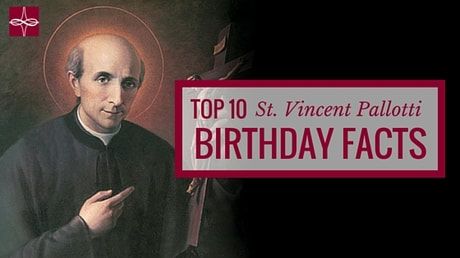



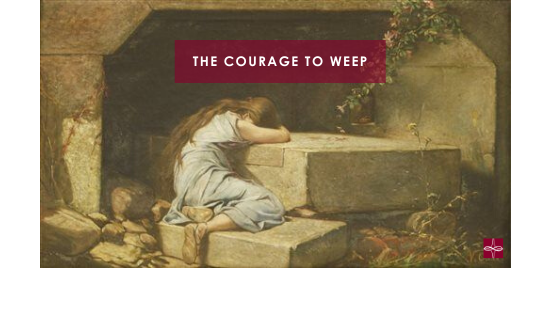

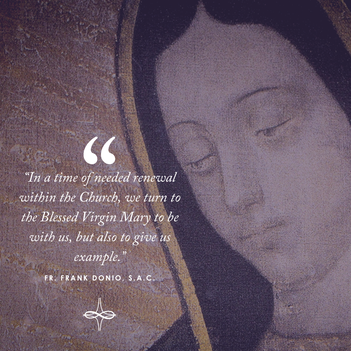
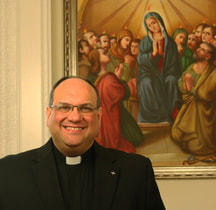
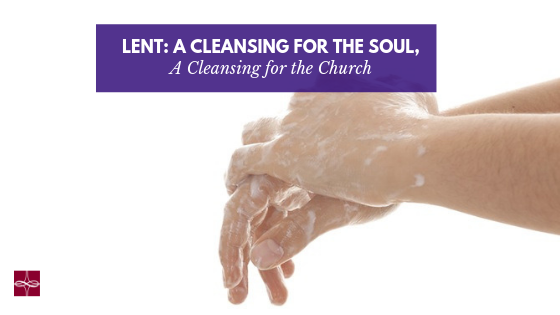

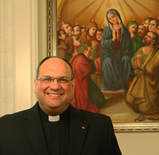
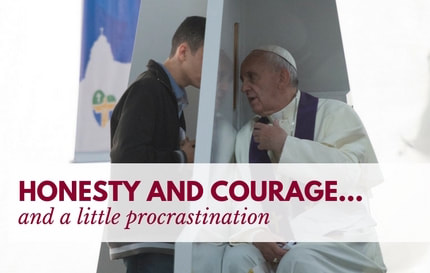

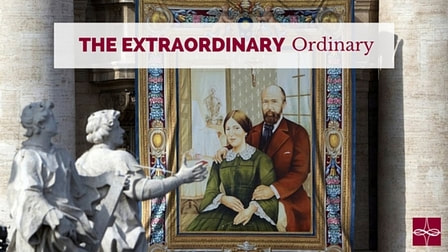

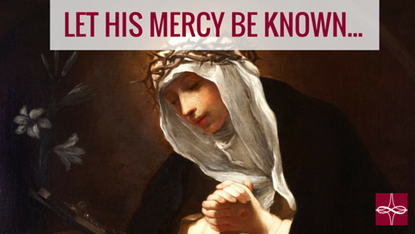




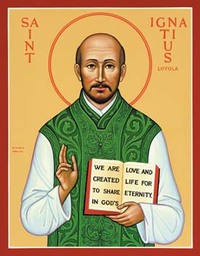
 RSS Feed
RSS Feed